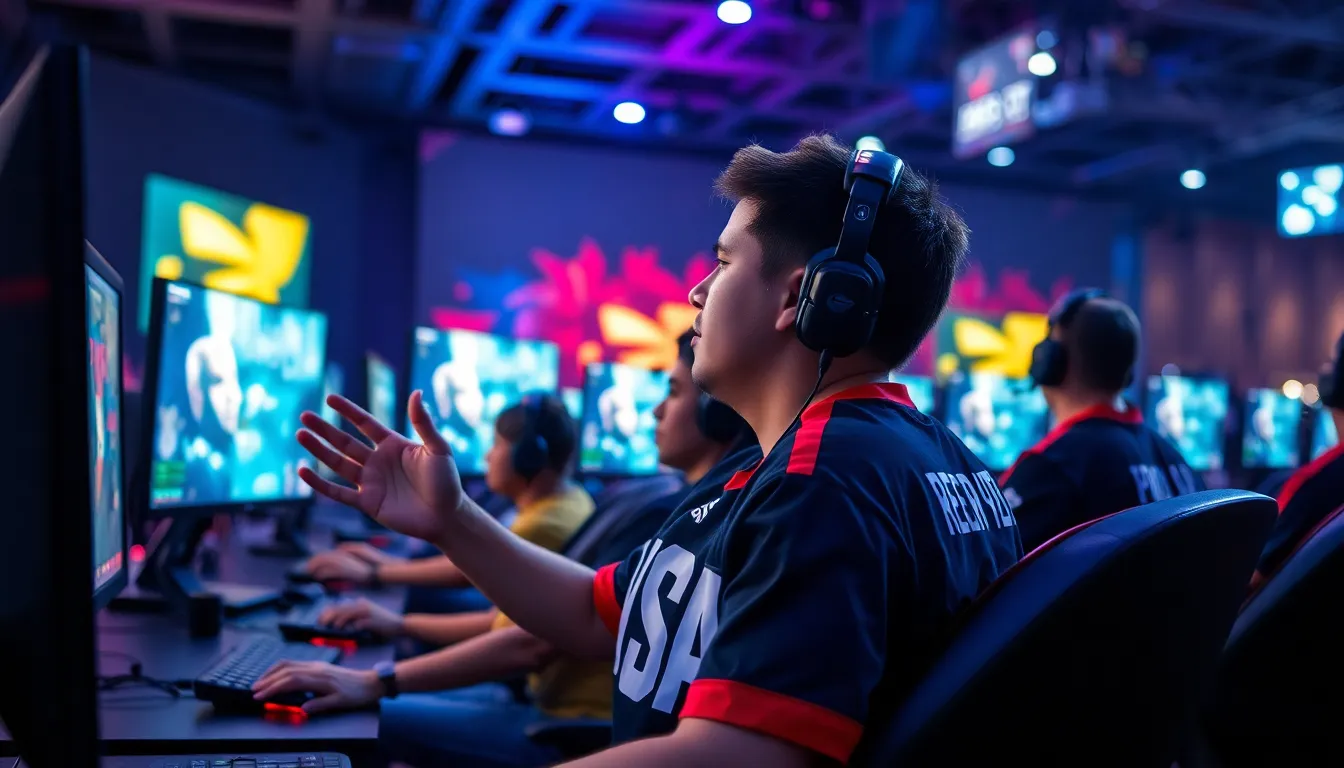The Best Fluffy Pancakes recipe you will fall in love with. Full of tips and tricks to help you make the best pancakes.

Competitive Gaming Genres: Unveiling the Thrills and Strategies Behind the Action
In a world where gaming isn’t just a hobby but a full-blown sport, competitive gaming genres are taking center stage. From the adrenaline-pumping action of first-person shooters to the strategic brilliance of real-time strategy games, there’s something for everyone. If you think gaming is just about high scores and late-night pizza runs, think again—it’s a battleground where skill reigns supreme and bragging rights are on the line.
Competitive Gaming Genres
Competitive gaming encompasses various genres, each with unique characteristics that appeal to different player skill sets. First-person shooters (FPS) rise to prominence, featuring fast-paced action where precision and reflexes play key roles. Popular titles in this genre include “Counter-Strike: Global Offensive” and “Call of Duty,” which host large-scale tournaments with substantial prize pools.
Real-time strategy (RTS) games require strategic thinking and resource management. Games like “StarCraft II” demand players to plan their moves in real time, creating an intense atmosphere for competition. Players often showcase their analytical skills and quick decision-making abilities in high-stakes matches.
Multiplayer online battle arena (MOBA) games stand out due to their team-based gameplay. Titles such as “League of Legends” and “Dota 2” involve two teams combating in strategic matches. MOBA players must communicate effectively and execute teamwork to dominate their opponents.
Fighting games like “Street Fighter” and “Tekken” emphasize individual skill and character mastery. Players compete in head-to-head matches, showcasing combos and tactical approaches to outmaneuver each other. The fighting game community organizes various tournaments, with events like EVO drawing significant crowds.
Battle royale games exemplify a blend of survival and competition. Games such as “Fortnite” and “PUBG” pit dozens of players against each other on expansive maps. The last player standing wins, emphasizing adaptability and clever tactics in dynamic environments.
Collectively, these genres illustrate competitive gaming’s diverse landscape. Each category not only attracts dedicated players but also fosters vibrant communities that engage with one another through events and tournaments.
Popular Competitive Gaming Genres

Competitive gaming features various genres, each attracting dedicated players and fostering unique skills. Some of the most popular genres include first-person shooters, multiplayer online battle arenas, and real-time strategy games.
First-Person Shooters (FPS)
First-person shooters dominate competitive gaming. Games like “Counter-Strike: Global Offensive” and “Call of Duty” exemplify fast-paced action and precision. Players engage in intense gameplay, requiring quick reflexes and accurate aim to succeed. Team strategies enhance the competitive aspect, with players collaborating to achieve victory. Tournaments often showcase the best FPS players, drawing large audiences and significant prize pools.
Multiplayer Online Battle Arena (MOBA)
Multiplayer online battle arenas attract players with their emphasis on teamwork and strategy. Titles such as “League of Legends” and “Dota 2” require players to master unique heroes and collaborate effectively. Each match involves a combination of skillful execution and strategic planning, fostering a dynamic environment. Competitive scenes thrive, with frequent tournaments and leagues featuring substantial rewards. Communication skills prove essential, as players must coordinate actions to secure objectives and defeat opponents.
Real-Time Strategy (RTS)
Real-time strategy games challenge players to think quickly and plan ahead. “StarCraft II” exemplifies the genre, where players manage resources and units in real time. Strategic thinking is critical, as decisions made in moments can determine match outcomes. Competitive RTS players showcase their abilities in tournaments, often testing their mettle against the best in the world. Each encounter emphasizes adaptability and foresight, making this genre a staple in competitive gaming.
Emerging Competitive Gaming Genres
New competitive gaming genres are gaining traction, expanding the gaming landscape beyond traditional categories. Two prominent examples are battle royale and card games.
Battle Royale
Battle royale games like “Fortnite” and “Apex Legends” emphasize survival and strategy in large, dynamic environments. Players compete against dozens or even hundreds of others, relying on quick decision-making and adaptability. The shrinking play area heightens tension, forcing engagements and creating thrilling moments. With events attracting millions of viewers, this genre has established a significant presence in professional gaming. Players’ skills in gunplay, building, and teamwork become crucial, making them stars in an evolving competitive scene. Tournaments often feature massive cash prizes, further incentivizing participation.
Card Games
Digital card games, such as “Hearthstone” and “Gwent,” offer a strategic battle of wits and deck building. Players craft personalized decks, balancing card types and abilities to outsmart opponents. Skillful play requires analyzing opponents’ strategies and countering effectively. Regular expansions introduce new cards, keeping the gameplay fresh and challenges unique. The community thrives on online leagues, tournaments, and ranked matches, fostering a competitive spirit. Engaging streams and content from top players enhance visibility, showcasing skills essential for success in this intricate genre. Generous prize pools attract talented players, solidifying the genre’s place in competitive gaming.
Factors Contributing to Competitive Success
Skill remains a primary factor in achieving success in competitive gaming. Players develop precision and quick reflexes, especially in genres like first-person shooters. Strategy plays a crucial role in multiplayer online battle arenas, where collaboration and effective planning determine outcomes.
Adaptability significantly influences performance in evolving game environments. Gamers excel when they can quickly change tactics based on opponents’ actions. Resource management becomes vital in real-time strategy games, emphasizing foresight under pressure.
Community support fosters player growth through shared knowledge and experiences. Engaging with fellow gamers promotes the exchange of strategies, enhancing individual capabilities. Participation in online leagues and tournaments offers practical experience and exposure to competitive dynamics.
Mental resilience defines players who thrive in high-stakes situations. Remaining calm and focused amid intense pressure helps individuals maintain performance levels during critical moments. Continuous practice serves to refine skills, reinforcing the pursuit of excellence.
Game design also contributes to competitive success. Titles that encourage teamwork and communication streamline collaborative efforts. These elements create synergies that enhance group strategies and ultimately lead to victories.
Rewards associated with competitive gaming drive motivation. The prospect of significant cash prizes attracts talented individuals, turning casual gamers into serious contenders. Growing visibility—through tournaments broadcast globally—enhances excitement, further inspiring participation.
Player commitment transforms ambition into tangible success. Setting clear goals and pursuing consistent improvement enables gamers to push boundaries. Consistent dedication paired with proper resources leads to notable achievements in competitive gaming.
Conclusion
The landscape of competitive gaming continues to evolve rapidly. With diverse genres catering to various player strengths and preferences, the competitive scene thrives on skill, strategy, and community engagement. As new games emerge and existing ones innovate, players are constantly challenged to adapt and improve.
The combination of mental resilience and teamwork is essential for success in this high-stakes environment. As tournaments grow in scale and popularity, the allure of substantial rewards keeps attracting new talent. Competitive gaming is more than just a pastime; it’s a dynamic arena where dedication and passion lead to remarkable achievements.
